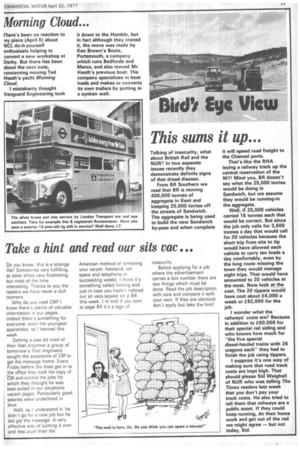This sums it up...
Page 35

If you've noticed an error in this article please click here to report it so we can fix it.
Talking of insecurity, what about British Rail and the NUR? In two separate issues recently they demonstrate definite signs of that dread disease.
From BR Southern we • read that BR is moving 400,000 tonnes of aggregate in Kent and keeping 25,000 lorries off the streets of Sandwich. The aggregate is being used to build the new Sandwich by-pass and when complete it will speed road freight to the Channel ports.
That's like the RHA laying a railway track up the central reservation of the Ml! Mind you, BR doesn't say what the 25,000 lorries would be doing in Sandwich, but we assume they would be running-in the aggregate.
Well, if 25,000 vehicles carried 16 tonnes each that would be correct. But since the job only calls for 3,500 tonnes a day that would call for 20 vehicles because the short trip from site to tip would have allowed each vehicle to carry ten loads a day comfortably, even by the long route missing the town they would manage eight trips. That would have amounted to 20 vehicles at the most. Now look at the cost. The 20 tippers would have cost about £4,000 a week or £92,000 for the job.
I wonder what the railways' costs are? Because in addition to £60,000 for their special rail siding and who knows how much for "the five special diesel-hauled trains with 26 wagons each" they had to finish the job using tippers. I suppose it's one way of making sure that road track costs are kept high. That should please Sid Weighell of NUR who was telling The Times readers last week that you don't pay your track costs. He also tried to tell them that railways are a public asset. If they could keep running, do their home work and get out of the red we might agree — but not today, Sid.




















































































